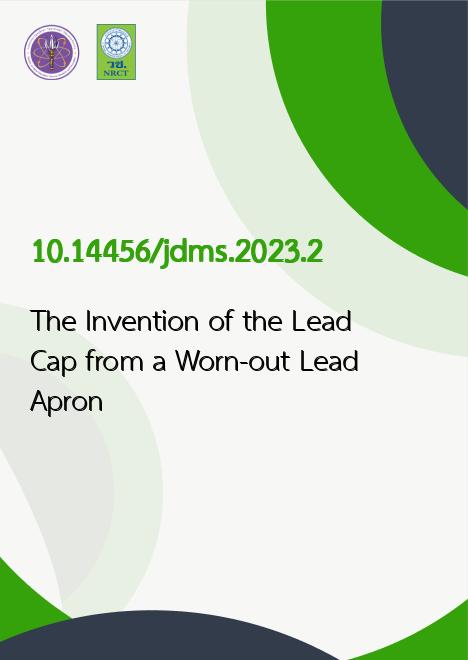
|
The Invention of the Lead Cap from a Worn-out Lead Apron |
|---|---|
| รหัสดีโอไอ | |
| Creator | Chalermporn Charoenwikrom |
| Title | The Invention of the Lead Cap from a Worn-out Lead Apron |
| Publisher | สำนักวารสารกรมการแพทย์ |
| Publication Year | 2566 |
| Journal Title | Journal of the Department of Medical Services |
| Journal Vol. | 48 |
| Journal No. | 1 |
| Page no. | 20-26 |
| Keyword | Brain tumor, Cardiologist, Radiation dose, Radiatian lead cap |
| URL Website | https://he02.tci-thaijo.org/index.php/JDMS |
| Website title | วารสารกรมการแพทย์ |
| ISSN | 2697-6404 |
| Abstract | Background: In the field of radiology, radiation protection equipment, such as a lead apron, is required. Whena leak occurs, it becomes unusable and is eventually discarded. A literature review has found that interventionalcardiologists who used digital subtraction angiography machines had an increased risk of brain tumors, especiallyon the left side of the brain. Neurological Institute of Thailand had some worn-out lead aprons; thus, they werereinvented into lead caps to use with the biplane digital subtraction angiography machine. Objective: 1) To inventa radiation lead cap from worn-out lead aprons. 2) To prevent radiation at physicians' and medical personnel'sheads. 3) To be a role model for those interested in bringing worn-out lead aprons to be reinvented as radiationprotection equipment. Method: The lead caps were made from worn-out lead aprons, which had a lead equivalentof 0.5 mmPb. The performance test resulted in no radiation leaks. The radiation protection efficacy test was doneby attaching a nanoDot optically stimulated luminescence (OSL) dosimeter outside and inside the lead cap. Then,X-rays were simultaneously irradiated to the lead cap via a Biplane digital subtraction angiography machine. Result:The measurements of radiation outside the lead cap compared with those inside the lead cap showed that theradiation dose was reduced by more than 94 percent. The Wilcoxon signed ranks test value of the radiation doseoutside the lead cap compared to the dose inside the lead cap at all locations had a p-value of 0.001, which was astatistically significant result. Conclusion: The invented lead cap can protect against radiation and reduce the risksof brain tumors. Worn-out lead aprons can be reinvented as a radiation-shielding device. |